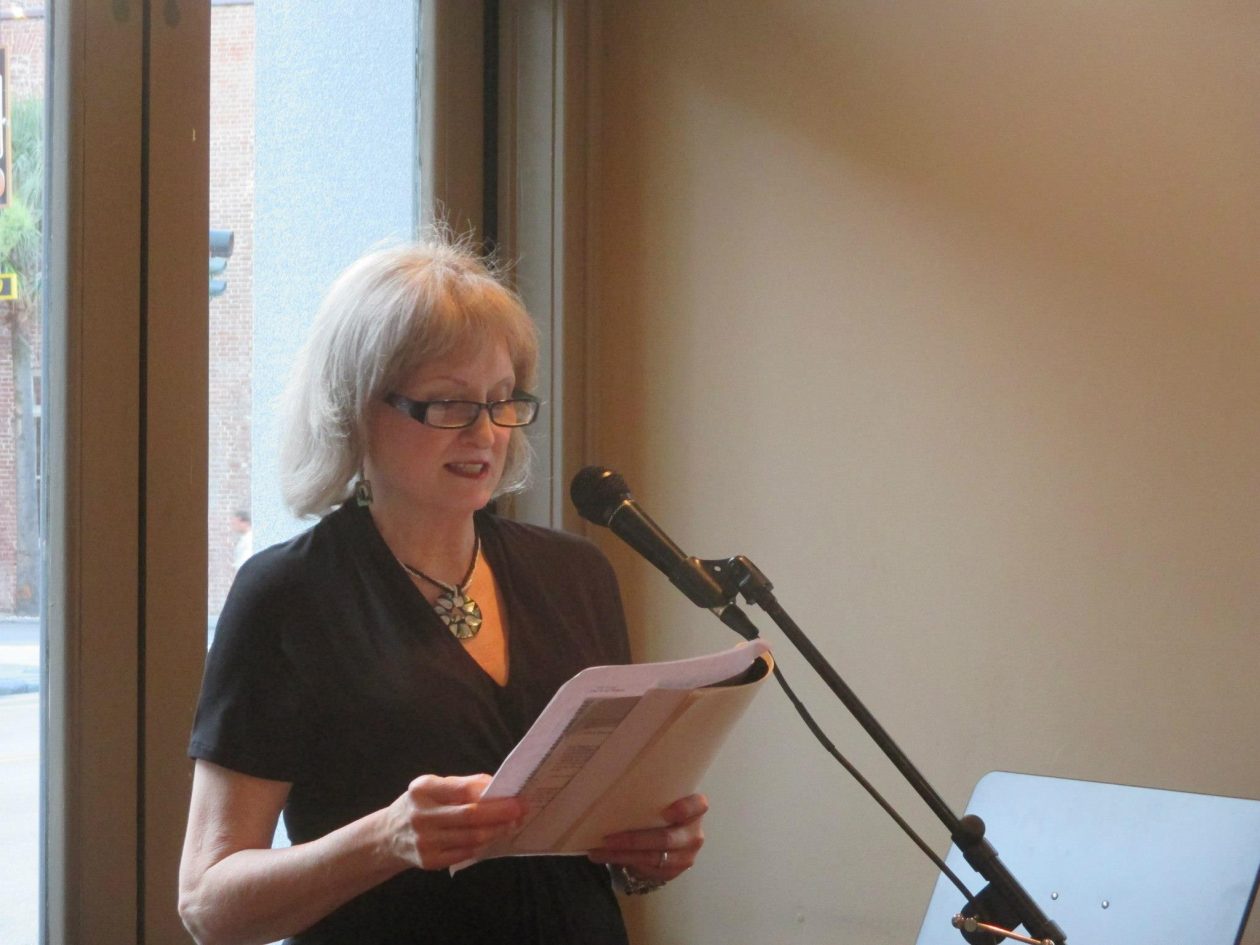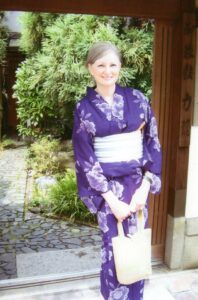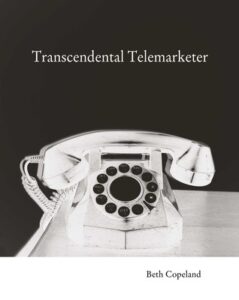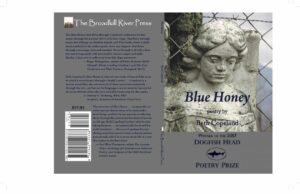
JULIA LEE BARCLAY-MORTON – YOGA, WATER AND REWRITING AUTISM
I interviewed writer Julia Lee Barclay-Morton about her experience of autism. Julia began as an experimental dramatist in New York, moving to the UK to


I interviewed Pushcart Prize nominated poet Beth Copeland about her multi-cultural background, the film of her poetry and the numerous awards she has received from Bright Hill Press, Arts & Letters, Atlanta Review, New Millennium Writings, North American Review, and The North Carolina Poetry Society. Beth’s latest volume Blue Honey includes strikingly personal poems dealing with her parents’ memory loss and has won the 2017 Dogfish Head Poetry Prize .
Leslie: Can you tell the story behind your interest in ‘fusing Eastern and Western themes and sensibilities, a hybrid culture I attempt to create in my work’?
Beth: I feel a close affinity to Asian culture because I spent part of my childhood in Japan and India, but it wasn’t until I read Agha Shahid Ali’s poetry that I became familiar with Eastern/Western fusion in poetry. Ali combines traditional European forms—sonnet, sestina, canzone—with Asian images and blends the Eastern ghazal with Western allusions. For example, his ghazal ‘Even The Rain’ takes the reader from a river ghat in Kashmir to New York at daybreak. The signature line at the end includes an allusion to e. e. cummings’ ‘somewhere I have never traveled, gladly beyond’:
“No one has such small hands, Shahid, not even the rain.”
Leslie: Would you like to expand on your use of the phrase ‘cognitive dissonance’ to describe being ‘raised between cultures’?
Beth: I was born in Japan and spent my early childhood there. When I was five, we moved to a small town in North Carolina. I was bilingual and had started learning to write simple katakana in addition to printing my name in English. My mother wanted my sisters and me to speak Japanese at home so we wouldn’t lose our fluency. But in Japan we spoke Japanese with our Japanese friends and English with our family. Speaking Japanese at home seemed unnatural because it was out of context. Our parents would ask us questions in Japanese, but we would answer in English or not answer at all. I wish I’d held onto the language I eventually lost, but at that time I lacked the ability to connect the two worlds that I’d compartmentalized.
Another example of cognitive dissonance was coming home to that small town after spending a year in Varanasi, India from 1963-1964 with my family as a seventh-grader. I’d had little or no contact with other American children and was looking forward to re-turning to my friends, but I soon discovered that I was not only a foreigner in India, but also an outsider in the United States. I didn’t know what the new eighth-grade slang expressions meant, what fashions were in or out, or who the Beatles were. The reverse culture shock of reentry to my own country was in some ways more confusing than the culture shock I experienced while living in India.
https://www.youtube.com/watch?time_continue=2&v=zcUXlPpz1wM
Leslie: As an example, could you comment on your prize-winning poem ‘Obi’, please?
Obi
My sister brings me an antique obi from Kyoto.
Maybe this gift is her way of saying I should go back
to visit the country where we were born, to see gardens
of raked sand, Shinto shrines, and maples
with leaves shaped like a child’s handprint.
I unwrap the sash of persimmon-colored silk
embroidered with gold chrysanthemums,
plum branches, and brocade fans like the paper
fan she folds and unfolds when she dances
the Odori with her hair pulled back
in a knot at the nape of her neck.
The nape of the neck is an erogenous zone
in Japan. Women wear the kimono loosely draped,
exposing the swan’s slope of shoulder, the neck
whitened with rice powder. Once
a man kissed me there, saying, “It’s so
warm, so soft.” I never really loved him. I guess
I’d been away from home too long to feel pleasure
or pain at the stork’s bite, unlike the woman
who stepped from this pool of fallen silk
into the floating world of the past,
the gray sumi-e rain.
Beth Copeland
Beth: Firstly, a glossary. ‘Obi’ is the sash worn with the kimono. (Once, someone read the title and thought it was going to be a poem about Star Wars!) ‘Shinto’ is the tradi-tional Japanese religion devoted to the worship of the sacred essence that appears in myriad forms reflected in nature. ‘Odori’ is a traditional Japanese dance. ‘The floating world’ or ‘ukiyo’ refers to urban culture during the Tokugawa Period of Japan (1600-1868) and to art and poetry celebrating the pleasures of nature and the body: beautiful women, kabuki actors, sumo wrestlers, and erotica. In Japanese, the word ‘ukiyo’ also contains an allusion to ‘the sorrowful world’ or Buddhist cycle of death and rebirth. ‘Sumi-e’ is ink brush painting.
Secondly, a few ideas about the content. The poem shifts from a description of the gift and my sister in the first stanza to a memory and fantasy in the second stanza. The syntax becomes more fragmented and abstract as the poem moves from the specifics of the first stanza to the imaginary—or floating—world at the end.
Leslie: ‘Still Life with One Apple’ is an ekphrasis. To what extent was writing about a work of art helpful in finding the words? How was it composed?
Still Life with One Apple
From earliest memory: one apple
in a bowl predating speech, spores
of sunlight floating on air like pollen
from the garden of Hesperides.
In childhood I wanted everything in pairs,
animals entering Noah’s ark two by two,
the symmetry of hand in hand,
heart to heart, bride and groom.
I thought the apple needed another apple
or at least the company of an orange or pear,
that the apple was lonely, that everything—
even an apple in a bowl—
had a soul. Was it wrong to believe
the apple could suffer and bleed,
to project my own feelings
onto that fruit?
To believe only a membrane
of matter and speed
separates blood from stone
and bone from apple seed.
To see the apple as a symbol
of the self, the universal soul,
as in Georgia O’Keefe’s Green
Apple on Black Plate,
a study in simplicity.
Still Life With An Empty Bowl—
I ate the apple to make it whole.
Beth Copeland
Beth: ‘Still Life with One Apple’ didn’t start as an ekphrasis. It started as a poem about an early childhood memory. As I worked on the poem, I pondered the symbolism of apples and searched for images of a single apple in art. I found Georgia O’Keeffe’s ‘Still Life with Green Apple’ and incorporated that allusion into the poem.
I spent many years writing and not writing that poem. More about that later….
Leslie: You say, ‘Content determines form and vice versa’. Can you give examples, please, of how one leads to the other?
Beth: I used couplets to reflect the pairing that was going on in ‘Still Life with One Apple’: “animals entering Noah’s ark two by two, / the symmetry of hand in hand, / bride and groom.”
Both stanzas in ‘Obi’ have the same number of lines because I wanted to show that the obi and the fantasy it evoked are two sides of the same reality, a tangible object and its reflection.
 Leslie: Can you describe the ups and downs of the long writing process that went into Transcendental Telemarketer?
Leslie: Can you describe the ups and downs of the long writing process that went into Transcendental Telemarketer?
Beth: I’m a very slow writer. It took me almost twelve years to write Transcendental Telemarketer. I experimented with what Roger Weingarten calls ‘reincarnated forms’ by taking a number of fixed forms —sestina, pantoum, canzone, tanka, unrhymed sonnet redoubled, and ghazal—and twisting and tweaking them. I enjoy the playfulness of working within form, but also enjoy writing poems that appear like ghosts and find their own organic forms.
Leslie: Can you describe the process of having a film made of a poem of yours, please? What have you learned from that experience?
Beth: The video artist Anh Vu selected my poem ‘Falling Lessons: Erasure One’ for a short film sponsored by Motionpoems, a nonprofit arts organization based in Minneapolis, and through a partnership with VIDA: Women in Literature. The poem is an erasure of a longer poem about my father’s Alzheimer’s disease.
Falling Lessons: Erasure One
My father steps into a field of lost
sensation, sunflowers, a yellow star.
He lives in the garden without maps.
My father dreams through
what he feels and believes is real.
He loses his memory, his flesh,
his child with seawater eyes.
He forgets the fog.
We forgot to speak and snow was falling
on blue mountains, a vein
of childhood, blood, and sorrow.
I walk into this memory when my thoughts
start falling into a funnel, when I’m failing
to love, falling into a freeze-frame
where time fades like the flurry
of furious wings. I fall.
I was surprised by the visceral reaction I had when I saw the film. It had been several years since my father had died, so I didn’t think my response would be so emotional. As I watched the father and daughter on the screen, tears streamed down my face. Vu’s film gave life to my experience in a way that the poem couldn’t do by itself. I could see, hear, and feel all the emotions I had felt when my father was alive. I thank her for giving me an opportunity to have that catharsis and for creating such a poignant, beautiful film to honor him. I’m grateful that Motionpoems and VIDA made the experience possible for me.
Leslie: How have you dealt with your father’s Alzheimer’s Disease and mother’s short-term memory loss, please? How has it changed you?
Beth: Writing about my parents’ dementia helped me cope with it in life. Through writing I was able to put my anguish into words and release my grief. My father died at age 95 after living several years in a nursing home with Alzheimer’s. While my mother was visiting him, she fell and broke her hip. After her injury, we discovered that she had short-term memory loss and could no longer live independently. Conversations with my mother were circular because within minutes she would forget the answers to questions she’d already asked. Our conversations were tedious and painstaking at times but also humorous. I used repetitious forms like the pantoum and sestina to write about phone conversations and visits with her. My father lost his ability to speak, but when a friend from his church played the piano, he could sing the hymns word for word. I wrote a reincarnated villanelle about my father’s miraculous singing.
 My third full-length poetry collection, Blue Honey, arose from my parents’ dementia and their gradual departure from this world. I’ve learned that grief is an ongoing process with many layers, one that sometimes begins long before death arrives. Blue Honey received the 2017 Dogfish Head Poetry Prize and is now available from The Broadkill River Press.
My third full-length poetry collection, Blue Honey, arose from my parents’ dementia and their gradual departure from this world. I’ve learned that grief is an ongoing process with many layers, one that sometimes begins long before death arrives. Blue Honey received the 2017 Dogfish Head Poetry Prize and is now available from The Broadkill River Press.
Leslie: Does art imitate life or vice versa?
Beth: Art imitates life, and life imitates art, sometimes simultaneously. For years, I was frustrated because I couldn’t come up with a closing couplet for ‘Still Life with One Apple’. All I had was one line. After going through a divorce, I looked at the poem again and realized that it was already finished. I didn’t need a couplet. I could end the poem with a single line. At the same time, the coupling and uncoupling that had happened organically in the poem happened in my life, too. I wasn’t able to see that the poem had already ended until my marriage had ended. Writing poetry isn’t just creating art printed on the page. It’s a process of discovery.

Next week voiceover artist Esther Wane talks about reading several well-known audiobooks – including Enid Blyton’s Malory Towers series, several of Jill Mansell novels and The Wild Other by Clover Stroud.
ABOUT LESLIE TATE’S BOOKS:

I interviewed writer Julia Lee Barclay-Morton about her experience of autism. Julia began as an experimental dramatist in New York, moving to the UK to

I interviewed Gillean McDougall from Glasgow, who edited the collaborative projects Honest Error (on Charles Rennie Mackintosh and his wife Margaret Macdonald) and Writing the

I interviewed French writer Delphine de Vigan, whose book, No et moi, won the prestigious Prix des libraires. Other books of hers have won a clutch

I interviewed Joanne Limburg whose poetry collection Feminismo was shortlisted for the Forward Prize for Best First Collection; another collection, Paraphernalia, was a Poetry Book Society Recommendation. Joanne

I interviewed Katherine Magnoli about The Adventures of KatGirl, her book about a wheelchair heroine, and Katherine’s journey from low self-esteem into authorial/radio success and
| Cookie | Duration | Description |
|---|---|---|
| cookielawinfo-checkbox-analytics | 11 months | This cookie is set by GDPR Cookie Consent plugin. The cookie is used to store the user consent for the cookies in the category "Analytics". |
| cookielawinfo-checkbox-functional | 11 months | The cookie is set by GDPR cookie consent to record the user consent for the cookies in the category "Functional". |
| cookielawinfo-checkbox-necessary | 11 months | This cookie is set by GDPR Cookie Consent plugin. The cookies is used to store the user consent for the cookies in the category "Necessary". |
| cookielawinfo-checkbox-others | 11 months | This cookie is set by GDPR Cookie Consent plugin. The cookie is used to store the user consent for the cookies in the category "Other. |
| cookielawinfo-checkbox-performance | 11 months | This cookie is set by GDPR Cookie Consent plugin. The cookie is used to store the user consent for the cookies in the category "Performance". |
| viewed_cookie_policy | 11 months | The cookie is set by the GDPR Cookie Consent plugin and is used to store whether or not user has consented to the use of cookies. It does not store any personal data. |
4 responses
I really enjoyed reading this post and learning what motivates Beth’s beautiful poetry, Leslie. Lovely post.
Thanks, Robbie. I’m pleased with Beth’s interview as well. Like you, I really rate her poetry! xxxxx
What a fascinating interview this is Beth, starting with your early years and influences. I was interested to read about Agha Shahid Ali and will google the ghazal, Even the Rain, that you mention. I particularly love the film poem, the fluidity of it and the gentle voice of the narrator. How poignant it is because of your father. I can understand the emotional impact it must have had. You write poetry that transcends the everyday and encourages the reader to consider “otherness”. The Japanese culture is so rich, you are blessed to be a part of it. I wish you well.
Hi Raine, thanks for such a thoughtful comment. You can read ‘Even the Rain’ here https://genius.com/Agha-shahid-ali-even-the-rain-annotated L x